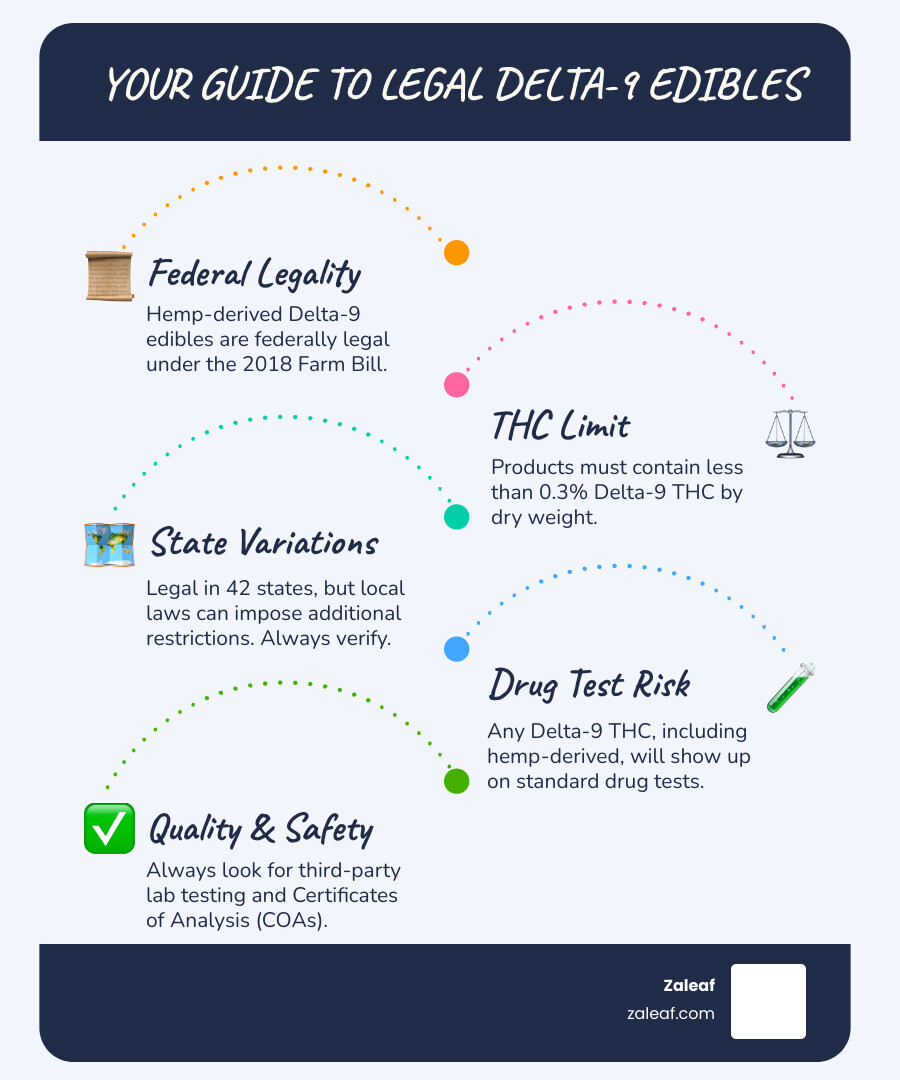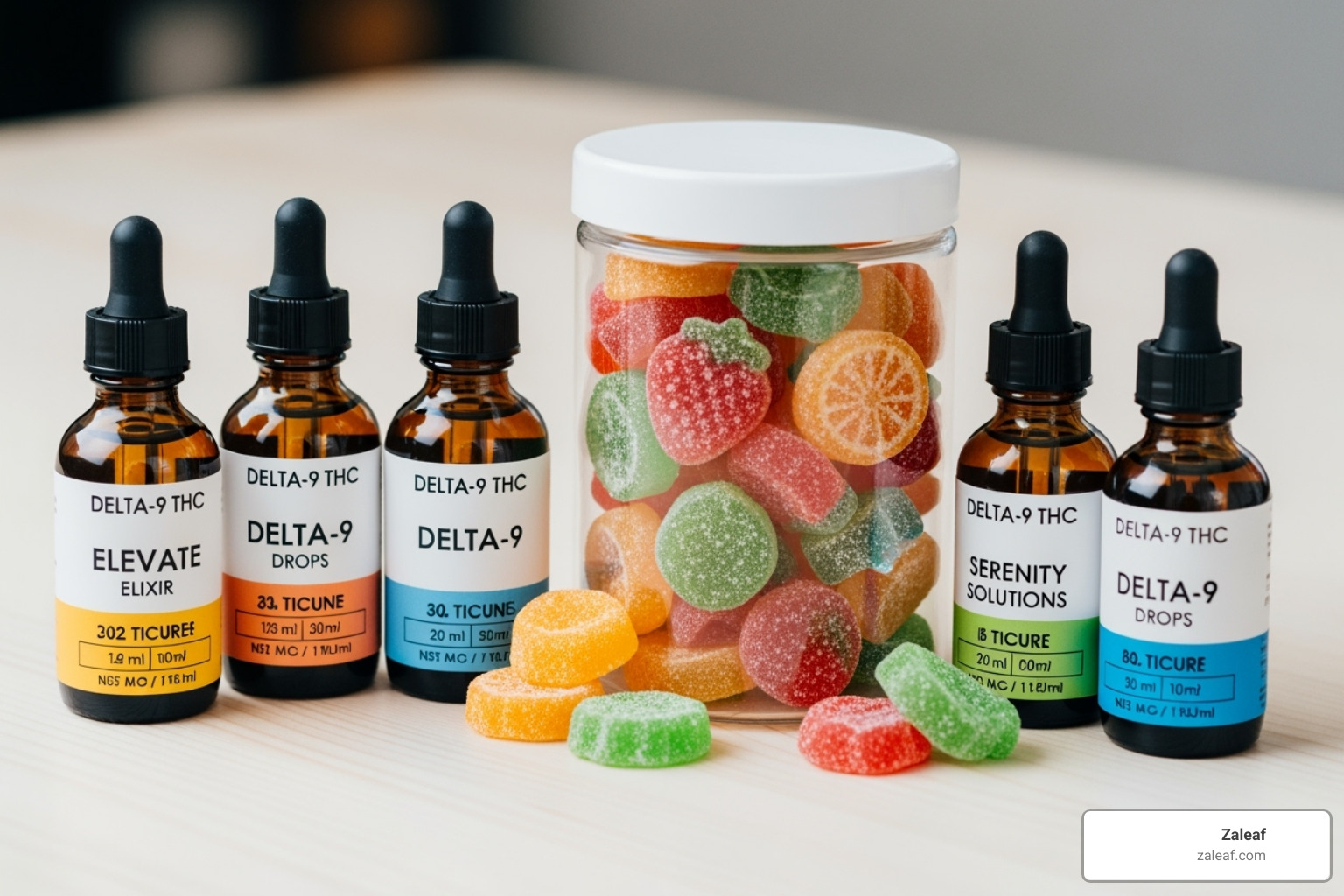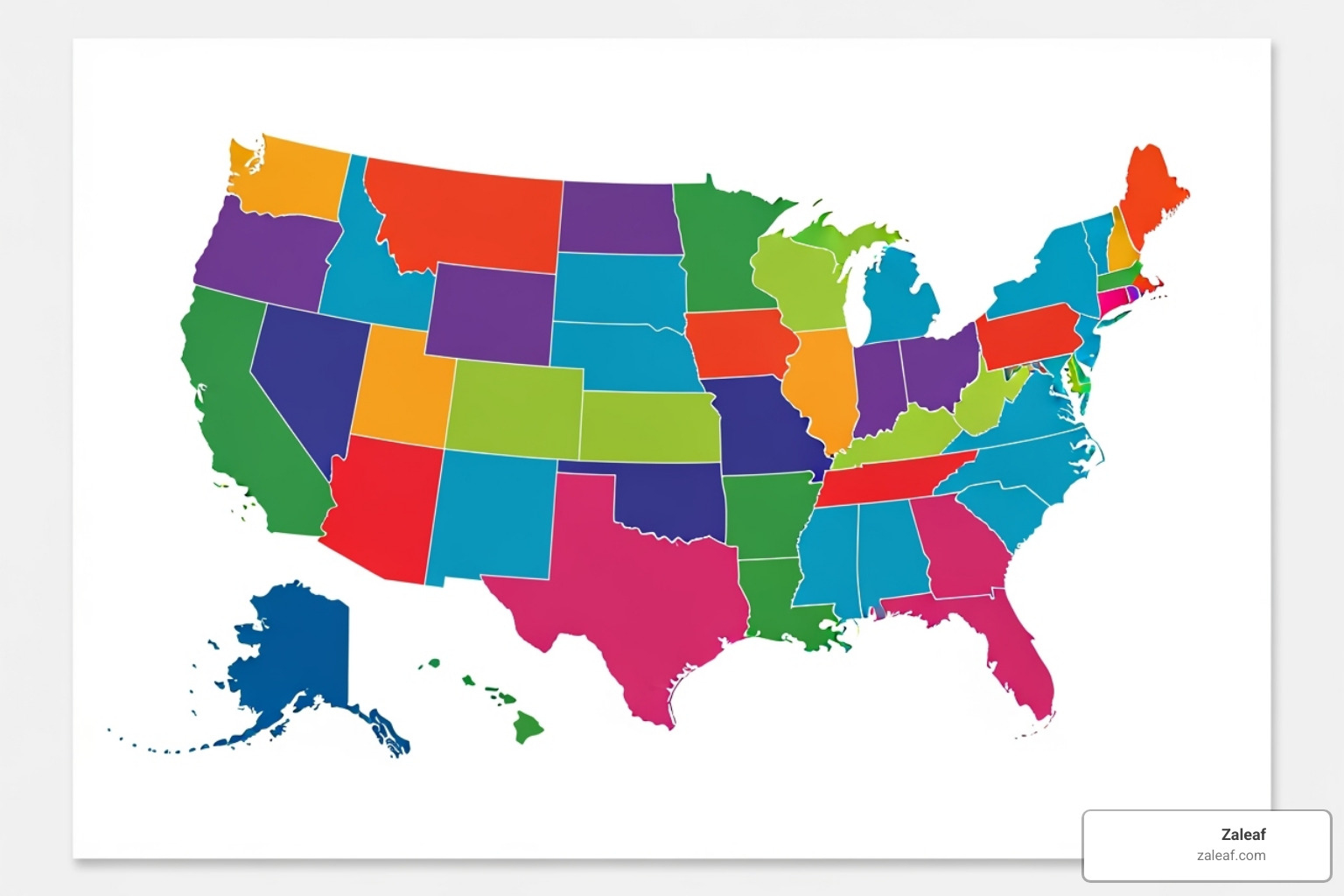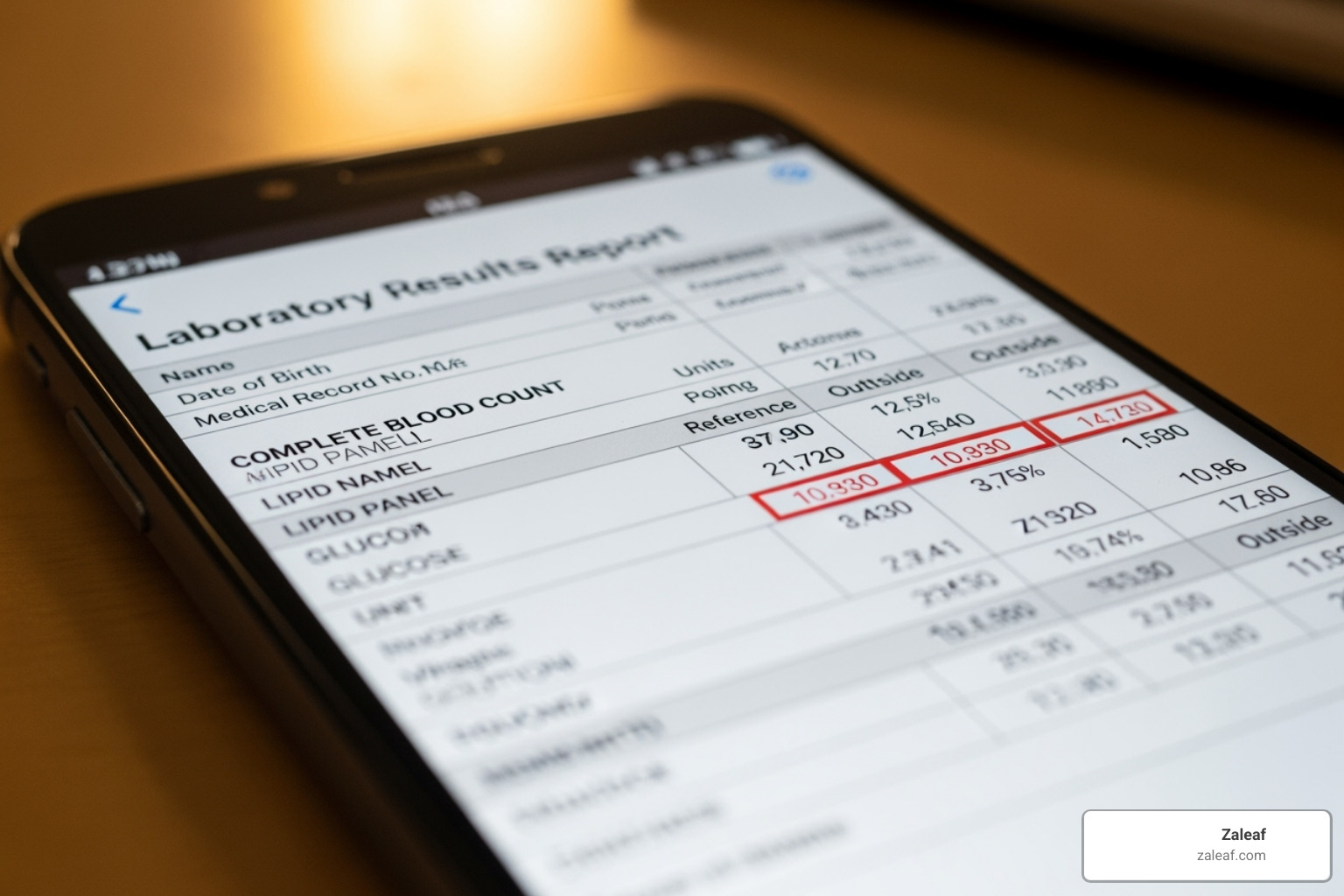The Law & Your Edibles: What's Legal in the World of Delta-9 and Hemp?

Understanding Delta-9 Edibles Legal Status: What You Need to Know
Delta-9 edibles legal status depends on one key factor: whether they're derived from hemp and contain less than 0.3% Delta-9 THC by dry weight. Here's what you need to know:
Federal Level:
- Hemp-derived Delta-9 edibles are federally legal under the 2018 Farm Bill
- Must contain ≤0.3% Delta-9 THC by dry weight
- No medical card required for purchase
State Level:
- Legal in 42 states, Puerto Rico, and Washington D.C.
- Some states have additional restrictions
- Always check your local laws before purchasing
Key Considerations:
- Will show up on drug tests
- Quality varies significantly between brands
- Third-party lab testing is essential for safety
The legal landscape around cannabis has changed dramatically since 2018. Hemp-derived products suddenly became accessible nationwide, but the rules aren't always clear. Many busy professionals find themselves confused about what's actually legal and safe to buy.
The reality is simple: if you're looking for legal Delta-9 edibles, you need products made from hemp that follow federal guidelines. But finding quality products that are properly tested and accurately labeled? That's where it gets tricky.
I'm Max Shemesh from Zaleaf, and I've spent years navigating the complex world of cannabinoid regulations while building partnerships with over 300 retailers nationwide. My experience in launching compliant Delta-9 products has shown me how confusing delta-9 edibles legal status can be for consumers seeking reliable, tested options.
This guide will walk you through everything you need to know about buying legal Delta-9 edibles safely and confidently.

Decoding Delta-9 THC: The Science Behind the Buzz
Understanding delta-9 edibles legal status starts with knowing exactly what you're dealing with. Delta-9 THC isn't just another cannabis buzzword – it's the main character in the cannabis story, and it's been fascinating scientists (and users) for decades.
What is Delta-9 THC?
Delta-9 Tetrahydrocannabinol is the rock star of cannabinoids. When someone mentions "THC," they're almost always talking about Delta-9. It's the compound that creates that familiar cannabis "high" – the euphoria, the giggles, and yes, those legendary munchies.
But here's where it gets interesting: Delta-9 THC works by tapping into your body's own internal communication system called the endocannabinoid system. Think of it as your body's natural balancing act, helping regulate everything from your mood and sleep to how you feel pain.
Delta-9 has a special relationship with CB1 and CB2 receptors in your brain and nervous system. When Delta-9 binds to these receptors, particularly the CB1 receptors in your brain, it creates those psychoactive effects that make Delta-9 so unique among cannabinoids.
The science behind this interaction is pretty remarkable. Your endocannabinoid system is constantly working to keep your body in balance, and Delta-9 essentially hijacks this system in a way that can produce both therapeutic and recreational effects. If you want to dive deeper into this fascinating system, Harvard's guide to the endocannabinoid system breaks it down beautifully.
For a broader look at how Delta-9 fits into the cannabis family tree, check out our comprehensive guide Beyond the Buzz: A Comprehensive Look at THC and Its Cousins.
Delta-9 vs. Delta-8 vs. CBD
The cannabinoid family can feel like a confusing reunion where everyone has similar names but completely different personalities. Let's clear up the confusion between the three most popular members.
| Feature | Delta-9 THC | Delta-8 THC | CBD (Cannabidiol) |
|---|---|---|---|
| Psychoactivity | Highly psychoactive (produces a "high") | Mildly psychoactive (milder "high") | Non-psychoactive (no "high") |
| Potency | Most potent | Approximately 20% less potent than Delta-9 | No intoxicating potency |
| Chemical Structure | Double bond on 9th carbon chain | Double bond on 8th carbon chain | Different molecular arrangement from THC |
| Typical Effects | Euphoria, relaxation, altered perception, increased appetite, potential anxiety/paranoia | Milder euphoria, clearer head, less anxiety, relaxation | Relaxation, calm, anti-inflammatory, pain relief, no intoxication |
Delta-9 THC is the heavyweight champion – it packs the strongest punch and creates the most noticeable effects. Delta-8 THC is like Delta-9's mellower cousin, offering about 20% less intensity with fewer side effects. Many people describe Delta-8 as providing a "cleaner" high with less anxiety or paranoia.
CBD is the peacekeeper of the family. It won't get you high at all, but it offers potential therapeutic benefits like relaxation and discomfort relief without any intoxicating effects.
The key difference comes down to tiny changes in their molecular structure. Delta-9 has its double bond on the 9th carbon chain, while Delta-8 has it on the 8th. This small change makes a big difference in how they affect you.
Curious about how these differences play out in vaping products? Our article Delta-9 vs. Delta-8 Disposable Vape Pens: Which is Right for You? explores this in detail.
Potential Benefits and Available Forms
Delta-9 THC isn't just about recreational fun – research suggests it may offer several potential wellness benefits. The way it interacts with your endocannabinoid system can support various aspects of your well-being.
Emotional wellness is one area where Delta-9 shines. By interacting with CB1 receptors, it can encourage the release of feel-good neurotransmitters that may help ease stress and promote happiness. Many users also report improved creativity and inspiration, making it popular among artists and creative professionals.
For those struggling with sleep, Delta-9's interaction with your body's natural sleep-wake cycle through CB1 receptors may promote more restful nights. The famous "munchies" effect comes from Delta-9's interaction with CB1 receptors in your hypothalamus, the brain region that controls appetite stimulation.
Delta-9 may also provide discomfort relief by working with both CB1 and CB2 receptors in areas of your body that process pain signals. Research has even explored its potential for anxiety, insomnia, muscle spasticity, and nausea relief. In fact, the FDA has approved synthetic Delta-9 THC for specific medical uses.
You can find research on THC's therapeutic potential in various scientific publications that detail these promising applications.
Delta-9 THC comes in several forms, each offering a different experience. Edibles and gummies are perfect for discreet, long-lasting effects without any inhalation. Oils work quickly when taken under your tongue, while tinctures offer versatile dosing options that you can add to food or drinks. Topicals provide localized relief without psychoactive effects, and vapes and flower deliver rapid onset for immediate results.
If you're specifically interested in edible options, our comprehensive guide Unwrapping Delta-9 THC Gummies: Benefits, Side Effects, and More covers everything you need to know about these popular products.

The Big Question: Are Delta-9 Edibles Legal?
Here's where things get really interesting – and honestly, a bit mind-bending! The delta-9 edibles legal landscape is like a puzzle where federal law meets state regulations, creating opportunities that many people don't even know exist.
The short answer? Yes, many Delta-9 edibles are completely legal. But the how and why behind this legality is fascinating and worth understanding if you want to shop confidently.
The 2018 Farm Bill: The Law That Changed Everything
Everything changed on December 20, 2018, when President Trump signed the 2018 Farm Bill into law. This wasn't just another agricultural bill – it was a game-changer that opened the door to legal Delta-9 THC products nationwide.
The magic lies in how the bill defines hemp. According to federal law, hemp is any Cannabis sativa plant containing 0.3% or less Delta-9 THC by dry weight. That tiny percentage might seem insignificant, but it created what industry insiders call the "weight-based loophole."
Here's where it gets clever: while the percentage of Delta-9 THC must stay below 0.3%, there's no limit on how much the edible can weigh. A heavier gummy means more total milligrams of Delta-9 THC while still meeting federal requirements.
Let's do some quick math. A standard 10-gram gummy can legally contain up to 30mg of Delta-9 THC and still comply with the 0.3% dry weight rule. That's enough to produce noticeable effects – all while being completely legal under federal law.
This regulatory framework has revolutionized access to hemp-derived products, as we explore in The Legal Landscape of Delta-8 THC Products.
Understanding the "Delta-9 Edibles Legal" Landscape
The key to understanding delta-9 edibles legal status comes down to one crucial distinction: where does the Delta-9 THC come from?
Hemp-derived Delta-9 edibles follow the 0.3% dry weight rule and are federally legal. These are the products you'll find from reputable online retailers who ship nationwide. They're made from hemp plants, carefully formulated to stay within federal guidelines, and don't require a medical card to purchase.
Marijuana-derived Delta-9 edibles come from cannabis plants that naturally exceed 0.3% THC. These remain federally illegal and are only available through state-licensed dispensaries in states with medical or recreational cannabis programs.
The beauty of hemp-derived products is their accessibility. You don't need to live in a cannabis-legal state or have a medical card. As long as your state allows hemp products, you can order them online and have them delivered to your door.
Understanding these regulations becomes even more important when you consider state-specific rules, like those covered in Gummy Bears or Gummy Bans? Understanding California's THC Rules.
State-by-State Variations
While federal law provides the foundation, individual states get to write their own rules – and some have chosen to be stricter than Uncle Sam.
The good news? Hemp-derived Delta-9 THC is legal in 42 states, plus Puerto Rico and Washington, D.C. That covers the vast majority of the country, making these products accessible to most Americans.
However, some states have decided to restrict or ban all forms of THC, regardless of whether they come from hemp. States where you might run into restrictions include Idaho, North Dakota, and a handful of others that have taken a more conservative approach to hemp regulation.
Here's what makes this tricky: laws change. What's legal today might face new restrictions tomorrow, and what's restricted now might become legal next year. State legislatures are constantly reviewing and updating their hemp and cannabis laws.
That's why we always recommend checking a comprehensive state law map from a reliable source before making any purchases. It's the most reliable way to stay current on your local regulations.
The bottom line? Most people in most states can legally purchase and consume hemp-derived Delta-9 edibles. But being an informed consumer means double-checking your local laws before you buy.

Safety, Risks, and Responsible Consumption
Now that we've covered the delta-9 edibles legal landscape, let's talk about something equally important: keeping yourself safe while enjoying these products. Just because something is legal doesn't mean you should dive in headfirst without understanding what you're getting into.
Think of it like learning to drive. It's legal once you have your license, but you still need to know the rules of the road, understand your vehicle, and respect the power you're wielding. The same applies to Delta-9 THC edibles.
Potential Side Effects and Risks
Delta-9 THC affects everyone differently, and understanding potential side effects helps you make informed choices. Most people experience mild effects that are more amusing than alarming. Dry mouth (also known as "cottonmouth") is probably the most common side effect - keep some water handy! You might also notice dry eyes, which can make you look like you just watched a really sad movie.
Then there's the famous increased appetite - yes, the munchies are real! Your taste buds might become your best friends, and that bag of chips suddenly seems irresistible. Some people also experience dizziness, short-term memory hiccups, or slowed reaction times. These effects are temporary but worth keeping in mind, especially if you're planning activities that require focus.
For some people, especially those new to Delta-9 or those who take too much, the experience can become less pleasant. Anxiety and paranoia can creep in, along with a rapid heart rate that makes you feel like you just ran a marathon while sitting on your couch. This is why the golden rule exists: start low and go slow.
The bigger picture includes some more serious considerations. Research shows that between 9% and 30% of people who use cannabis regularly may develop cannabis use disorder. If you find yourself unable to stop using despite negative consequences, that's worth paying attention to.
For younger users, the stakes are higher. Studies suggest that cannabis use during adolescence might affect brain development, potentially impacting memory and learning abilities. While we're still learning whether these effects are permanent, it's a compelling reason why these products should stay in adult hands.
Want to dive deeper into edible safety? Check out Cannabis Edibles: Are They Safe or Bad for You? and learn about managing unexpected experiences in The Unwanted Trip: Common Side Effects of Cannabis Edibles.
The Problem with Unregulated Products and Inaccurate Labeling
Here's where things get really concerning. The hemp industry's rapid growth has outpaced quality control in many cases, creating a wild west situation where not all products are what they claim to be.
Recent research on hemp-derived Delta-9 products revealed some shocking statistics. A staggering 66% of products contained significantly different amounts of Delta-9 THC than what their labels claimed. Imagine ordering a small coffee and sometimes getting decaf, sometimes getting a triple shot - that's essentially what's happening with many Delta-9 products.
Even more concerning, 49% of products achieved their Delta-9 THC levels by converting CBD to THC through chemical processes. While this isn't necessarily dangerous when done properly, it can introduce impurities and may violate state laws that prohibit chemically modified hemp components.
The testing situation is equally troubling. While most companies provide a Certificate of Analysis (COA), 71% of these COAs don't include testing for contaminants like pesticides, heavy metals, or residual solvents. That's like getting a health report that only checks your height but ignores everything else.
Perhaps most alarming, only 15% of companies implemented proper age verification at checkout, making it far too easy for minors to purchase intoxicating products online.
These findings, detailed in this Potency and safety analysis of hemp products, highlight why choosing reputable brands with rigorous testing standards isn't just smart - it's essential for your safety.
Will Delta-9 Show Up on a Drug Test?
Let's cut straight to the chase: yes, absolutely. This is one of the most important things to understand about delta-9 edibles legal status. Just because your Delta-9 THC comes from federally legal hemp doesn't change its chemical structure.
Drug tests don't care about the source of your THC - they only detect THC metabolites. Whether your Delta-9 came from a legal hemp gummy or illegal marijuana, it's all the same to a drug test. The testing equipment can't tell the difference, and frankly, neither can your body's metabolism.
Detection windows vary based on several factors including your metabolism, how often you use products, and how much you consume. Urine tests can detect Delta-9 THC anywhere from 3 days to over a month after use. Blood tests typically catch it for about a week, while saliva tests usually detect it for 1-3 days. Hair tests have the longest memory, potentially showing Delta-9 use for up to 90 days.
If you have an upcoming drug test for work, sports, or legal reasons, avoid all Delta-9 THC products - period. It's not worth the risk to your career or other important aspects of your life. For more detailed information about Delta-9 and drug testing, read THC Gummies and Drug Tests: Will They Show Up?.
The bottom line? Respect these products, choose quality brands that prioritize testing and transparency, and always consider how your choices might affect other areas of your life. Your future self will thank you for being thoughtful and responsible.
How to Buy High-Quality, Legal Delta-9 Edibles Online
Finding trustworthy delta-9 edibles legal products online can feel overwhelming. With hundreds of brands claiming to offer the best products, how do you separate the wheat from the chaff? The key lies in knowing what quality markers actually matter.
What to Look for in a Reputable Brand
When you're shopping for Delta-9 edibles, certain red flags and green flags become your best friends. The most important indicator of a reputable brand is third-party lab testing. This isn't just a nice-to-have – it's absolutely essential. Every single product batch should come with a Certificate of Analysis from an independent laboratory.
Clear hemp sourcing is another crucial factor. Quality brands will tell you exactly where their hemp comes from, with US-grown hemp being the gold standard. Domestic cultivation follows stricter agricultural regulations, giving you better peace of mind about what you're consuming.
Look for brands with positive reviews and reputation in the cannabis community. While reviews aren't everything, a pattern of satisfied customers and industry recognition speaks volumes. Transparent manufacturing practices also matter – reputable companies will openly discuss their extraction methods, with CO2 extraction generally being preferred for its cleanliness and efficiency.
Finally, pay attention to responsive customer service. A brand that values its customers will be accessible and eager to answer your questions thoroughly. They won't hide behind vague marketing speak when you ask about their testing protocols or sourcing practices.
At Zaleaf, we've built our reputation on these exact principles. We offer 100% legal cannabis products with fast shipping and discrete packaging, specializing in enhancing cannabinoid and terpene profiles for mood-specific effects. All our products undergo rigorous third-party testing, and you don't need an ID or medical card to purchase where legal.
For more guidance on finding trustworthy retailers, check out Edible Delights: Where to Buy Legal THC Edibles Online.
Reading a Certificate of Analysis (COA)
Think of a Certificate of Analysis as your product's report card – and just like in school, you want to see good grades across the board! This document is your window into what's actually in your Delta-9 edible, beyond what the packaging claims.
Verifying potency is the first thing to check. The COA will list precise amounts of Delta-9 THC, CBD, Delta-8 THC, and other cannabinoids present. Most importantly, confirm that the Delta-9 THC content stays below that crucial 0.3% by dry weight threshold to ensure federal legality.
The contaminant testing section is where things get serious. A comprehensive COA tests for pesticides (harmful farming chemicals), heavy metals like lead, mercury, cadmium, and arsenic that can accumulate in plants, residual solvents from the extraction process, and microbial impurities including mold, yeast, and dangerous bacteria like E. coli or salmonella.
Always match the batch number on the COA with the one on your product packaging. This confirms you're looking at test results for the exact product you purchased, not some generic report. Look for COAs from ISO/IEC 17025 accredited labs – this accreditation means the lab meets international standards for technical competence.
Understanding these reports puts you in the driver's seat of your cannabis experience. You're not just trusting marketing claims; you're seeing scientific proof of what you're consuming. We explore this topic in greater detail in The Ins and Outs of Third-Party Lab Testing.

Your Guide to the "Delta-9 Edibles Legal" Shopping Experience
Shopping for delta-9 edibles legal products doesn't have to be a guessing game. With the right approach, you can confidently find high-quality products that deliver the experience you're seeking.
Start by verifying legality in your area – even hemp-derived Delta-9 THC isn't legal everywhere, and state laws can be stricter than federal guidelines. Once you've confirmed you're in the clear legally, focus on choosing reputable brands that demonstrate transparency through clear sourcing, manufacturing practices, and genuine customer reviews.
Never compromise on third-party lab testing. Any brand worth your money will provide easy access to comprehensive Certificates of Analysis for every product batch. When you scrutinize that COA, confirm the cannabinoid potency meets legal requirements and check for the absence of harmful contaminants.
If you're new to Delta-9 edibles, start low and go slow. Begin with a small dose (5mg or less) and wait at least two hours before considering more. Edibles can take time to kick in, and patience prevents unpleasant surprises.
Remember to be mindful of drug tests – all Delta-9 THC will show up regardless of its legal hemp source. Finally, consider your specific needs. Are you looking for relaxation, creativity, better sleep, or something else? Choose products with cannabinoid and terpene profiles designed for those mood-specific effects.
By following this approach, you're not just buying an edible – you're investing in a safe, informed, and enjoyable experience custom to your needs. For additional guidance on finding the perfect gummy, our An Essential Guide to Finding the Best THC Gummies offers valuable insights.
Conclusion: Navigating the World of Legal Delta-9 with Confidence
The world of delta-9 edibles legal status doesn't have to feel like a maze anymore. Once you understand the basics, it's actually pretty straightforward. The 2018 Farm Bill changed everything by making hemp-derived Delta-9 THC products federally legal - as long as they contain no more than 0.3% Delta-9 THC by dry weight. This simple rule opened doors that had been locked for decades.
But here's the thing: legal doesn't automatically mean safe or high-quality. We've seen the concerning statistics - 66% of products don't match their labels, and many companies skip important safety testing. That's why your role as an informed consumer is so crucial.
The patchwork of state laws adds another layer to consider. While hemp-derived Delta-9 is legal in 42 states, your specific location might have different rules. Always check your local laws before making a purchase. It's a small step that can save you big headaches later.
Consumer diligence is your superpower in this market. Look for brands that provide comprehensive third-party lab testing, clear sourcing information, and transparent manufacturing practices. Don't settle for products without proper Certificates of Analysis, and never trust a company that won't answer your questions.
At Zaleaf, we've built our entire approach around the belief that you deserve complete transparency and safety. Every single one of our hemp-derived Delta-9 edibles undergoes rigorous third-party testing - not just for potency, but for contaminants like pesticides, heavy metals, and residual solvents. We don't just meet compliance standards; we exceed them because your safety and trust matter more than cutting corners.
The cannabis industry is still evolving, and that makes reliable information and trustworthy brands more important than ever. When you understand the legal framework, recognize potential risks, and know what quality looks like, you can steer this space with complete confidence.
Delta-9 edibles legal status is just the starting point. The real goal is finding products that are safe, accurately labeled, and designed to deliver the experience you're looking for. Whether you're seeking relaxation after a long day, creative inspiration, or better sleep, the right product from the right company can make all the difference.
For a deeper dive into why transparency matters so much in this industry, check out Beyond the Label: Explaining Third-Party Testing.
We're here to make sure your Delta-9 journey is not only legal and safe, but genuinely enjoyable. That's what you deserve, and that's what we're committed to delivering.


